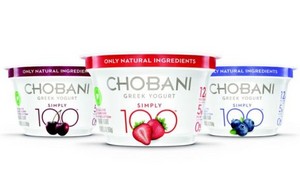Chobani's Controversial New Ad Campaign
 Last week, Chobani aired a cheeky new television spot that pits Simply 100, the Greek yogurt maker's new low-calorie offering, against the competition. The commercial opens with a woman lounging on a poolside chair. She reaches for a cup of Dannon Greek yogurt, reads its ingredients, and then promptly throws it into the garbage. In the background, the voice of a narrator calmly explains what's going on: "Dannon Light & Fit Greek actually uses artificial sweeteners like sucralose. Sucralose—why? That stuff has chlorine in it."
Last week, Chobani aired a cheeky new television spot that pits Simply 100, the Greek yogurt maker's new low-calorie offering, against the competition. The commercial opens with a woman lounging on a poolside chair. She reaches for a cup of Dannon Greek yogurt, reads its ingredients, and then promptly throws it into the garbage. In the background, the voice of a narrator calmly explains what's going on: "Dannon Light & Fit Greek actually uses artificial sweeteners like sucralose. Sucralose—why? That stuff has chlorine in it." Another new video takes aim at Yoplait's low-calorie offering, alarming consumers that it has potassium sorbate. "That stuff is used to kill bugs," it exclaims.
The message Chobani is sending is clear: our product is natural; theirs is not. And it's doing it loudly. The war is not only being waged on cable, but also in print, where the company has run full page ads, and on its website. "Did you know not all yogurts are equally good for you?" anyone who visit the site sees at the very top, setting the stage for the various videos, graphics, and flyers that follow, all of which tout the relative purity of Chobani's product.
Naturally, those it disparages haven't appreciated the initiative. Shortly after the ads appeared, Dannon sent a cease-and-desist letter to Chobani, asking for an immediate end to the campaign. "These Simply 100 advertisements are false, misleading and deceptive, will deceive consumers, and have caused and will continue to cause immediate and irreparable injury to Dannon, as well as to consumers," Marcella Ballard, a lawyer who represents the French company, wrote in the letter to Chobani.
Sucralose is a popular artificial sweetener and potassium sorbate is a widely used preservative. Both are considered safe for use in foods by the FDA.
Dannon contends that Chobani's campaign is misleading, presumably because it scares consumers away from ingredients the government says are fit for consumption.
Chobani, for its part, resists that characterization. "We're empowering consumers with facts and information to help them make more informed decisions," Peter McGuinness, Chobani's chief marketing and brand officer, said in a statement. The Greek yogurt behemoth filed an action Monday morning asking that a New York U.S. District Court declare that its campaign is neither false or misleading.
The provocative ads come at an interesting time for the Greek yogurt market. The industry is still growing in the United States, but not at the otherworldly clip it once was. Sales are growing by a modest 5 percent, according to data from Nielsen. Just three years ago, industry growth towered above 60 percent.
In response, manufacturers are working to differentiate themselves from the competition to adjust. And what better way than by underscoring the artificiality of others' products? Recent surveys have shown an overwhelming majority of yogurt buyers want to avoid ingredients they associate with processing. In fact, 93 percent of light yogurt eaters specifically prefer natural to artificial products, according to data from market research firm Mintel.
Chobani, which is the largest Greek yogurt seller in the world, understands this, and isn't being shy about exploring what happens when they put that knowledge to test.
"We know people are concerned about artificial sweeteners in their food, and this campaign is about giving them truthful and accurate information," McGuinness said.
(Roberto A. Ferdman, The Washington Post)
Last modified onSaturday, 06 May 2017 10:07
Tagged under
Latest from Admin TOA
- 300 migrants to be housed at shuttered Catholic church on Northwest Side in Chicago
- Turkish Stand-Up Sensation Hasan Can Kaya Embarks on U.S. Tour with Art Evi Production, in212 Production, and TAAS New York
- "Lean Startup, To Lean Company, To Rich Exit" by Dr. Kenan Sahin is released with Forbes Books
- LOSEV USA Ramadan Campaign Let the Children Heal First with Your Ramadan Donations
- Azerbaijan Society of America Honors Centennial Anniversary of the Great Azerbaijani Politician the National Leader of Azerbaijan President Heydar Aliyev
